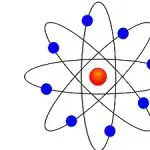Liquefied Petroleum Gas or LPG is the very known name for all of you, as it is known as the cooking gas. It is one of the natural gas which can be obtained as a by-product from the processing of natural gas and petroleum refining. It consists of butane, propane and butylene. Compressed Natural Gas or CNG is widely used gas in cars, and it is also a natural gas which is obtained … [Read more...] about Difference Between Liquefied Petroleum Gas (LPG) and Compressed Natural Gas (CNG)
Science
Difference Between Bohr and Rutherford’s Atomic Models
Niels Bohr postulates the atomic model which states that electrons move in specific circular orbits around the nucleus with quantized kinetic and potential energies. Ernest Rutherford said that an atom consists of the whole mass that is concentrated into the center. From the above statement, we can say that both the models of the atom differ in the way they explained the … [Read more...] about Difference Between Bohr and Rutherford’s Atomic Models
Difference Between Green and White Revolution
The Green Revolution is the programme started in India and other developing countries to increase the production of wheat and rice and become self-sufficient. On the other hand, White Revolution or Operation Flood is an association with the objective of increasing milk production in India. Let's get back to history, the Third Agricultural Revolution or the Green Revolution … [Read more...] about Difference Between Green and White Revolution
Difference Between Kharif and Rabi Crops
Kharif and Rabi are the two varieties or group of crops that have been divided based on the season they require to grow. For instance, Jowar, Bajra, Maize, Sugarcane, Cotton, Pulses, etc., are such plants that grow in the rainy season and so-known as Kharif crops. On the contrary, Oats, Wheat, Gram, Barley, etc., are such plants that grow in the winter season and so-termed as … [Read more...] about Difference Between Kharif and Rabi Crops
Difference Between Conductors, Semiconductors and Insulators
Conductors, semiconductors and insulators can be distinguished on the ground of their conductivity and other properties. Conductors like metals show conductivity at room temperature, but as the temperature increases, their conductivity gets reduced. However, semiconductors act as the insulators at low temperature but as the temperature increases so their conducting … [Read more...] about Difference Between Conductors, Semiconductors and Insulators





